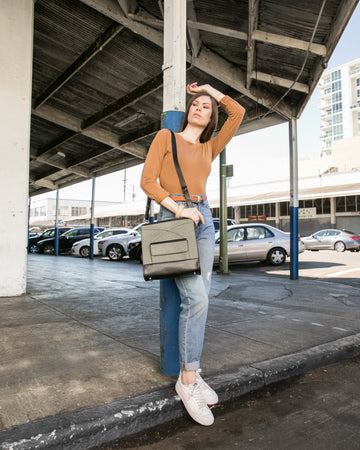As the fashion industry grapples with the environmental impact of traditional materials, innovative solutions are emerging to redefine the way we approach accessory design. In recent years, sustainable and vegan materials have gained traction, and their evolution is at the forefront of a green revolution.
In this article, we explore the crucial role of innovation in the development of sustainable vegan bag materials, examining how these advancements contribute to a more eco-friendly and ethical fashion landscape.
The Rise of Sustainable Vegan Bags

The growing awareness of environmental issues and ethical concerns has led to an increased demand for sustainable fashion choices. Vegan bags, crafted without the use of animal-derived materials, have become a popular choice among eco-conscious consumers. However, the true game-changer lies in the innovative materials that are shaping the future of sustainable fashion.
Plant-Based Alternatives
One of the key innovations in sustainable vegan bags is the use of plant-based materials. Traditional leather, often associated with environmental degradation, has given way to alternatives such as pineapple leather (Piñatex) and mushroom leather (Mycelium). These materials not only mimic the texture and durability of animal leather but also offer a cruelty-free and sustainable option for fashion enthusiasts.
Recycled and Upcycled Fabrics

In the quest for sustainability, designers are turning to recycled and upcycled fabrics to create vegan bags with a reduced environmental footprint. From recycled PET bottles transformed into durable textiles to upcycled denim and canvas, these materials contribute to waste reduction while offering stylish and guilt-free accessories.
Bio-Based Polymers and Plastics
Innovations in bio-based polymers and plastics are pushing the boundaries of vegan bag materials. Derived from renewable resources such as cornstarch or sugarcane, these materials provide a viable alternative to petroleum-based plastics. The development of bio-based polymers offers durability, versatility, and the potential for fully biodegradable options, addressing concerns about the end-of-life impact of fashion products.
Nanotechnology in Textiles

Nanotechnology has also found its way into the realm of sustainable fashion. Nanomaterials can enhance the properties of vegan bag materials, making them water-resistant, stain-resistant, and even capable of self-cleaning. This not only increases the longevity of the bags but also reduces the need for harsh chemical treatments that can harm the environment.
Closed-Loop Systems and Circular Design
The adoption of closed-loop systems and circular design principles is revolutionizing the production and disposal of vegan bags. Brands are increasingly focusing on creating products that can be easily disassembled, recycled, or repurposed at the end of their life cycle. This shift toward circularity aligns with the broader goals of reducing waste and promoting sustainability in the fashion industry.
The Role of Fashion-Tech Collaborations

Collaborations between fashion designers and technology innovators are driving advancements in sustainable vegan bag materials. From 3D printing techniques to smart textiles embedded with sensors, these collaborations are pushing the boundaries of creativity and functionality while maintaining a commitment to ethical and eco-friendly practices.
Consumer Awareness and Education
The impact of innovation in sustainable vegan bag materials goes beyond the design studio. Consumer awareness and education play a pivotal role in driving demand for eco-friendly fashion. Brands that prioritize transparency in their material choices and production processes empower consumers to make informed decisions, fostering a culture of sustainability in the fashion market.
Conclusion

In conclusion, the role of innovation in sustainable vegan bag materials is transforming the fashion industry. From plant-based alternatives to advanced nanotechnology, these materials not only offer ethical choices for consumers but also pave the way for a more sustainable future.
As designers, manufacturers, and consumers continue to embrace these innovations, the fashion landscape is evolving towards a greener and more conscientious industry. Embracing these advancements is not just a trend but a crucial step towards a more sustainable and compassionate approach to fashion.
FAQ’s
How do recycled and upcycled fabrics contribute to sustainability in vegan bags?
Recycled and upcycled fabrics used in vegan bags help reduce environmental impact by repurposing materials that would otherwise contribute to waste. For example, bags made from recycled PET bottles or upcycled denim contribute to a circular economy, minimizing the need for new resources.
Are there vegan bags suitable for specific occasions, such as formal events or outdoor activities?
Yes, vegan bags come in a wide variety of styles suitable for various occasions. Whether you're attending a formal event, going to the office, or engaging in outdoor activities, there are vegan bags designed to meet both your style preferences and functional needs.
How can I dispose of a vegan bag at the end of its life cycle?
To dispose of a vegan bag responsibly, consider recycling it if possible. Some brands may offer take-back programs or recycling initiatives. If recycling is not an option, donating the bag or repurposing it in creative ways can extend its life, contributing to a more sustainable approach to fashion consumption.







